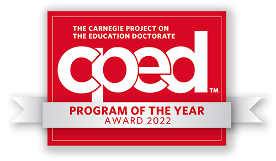Education
Professional Doctorate: Boston, MA
More Program Options
Northeastern University’s online Doctor of Education program provides experienced adult learners, working professionals, and scholar-practitioners from diverse backgrounds and perspectives with the practical knowledge and experience they need to transform the learning landscape. Students gain innovative approaches to create authentic change in their communities. The program was selected as the Carnegie Project on the Education Doctorate's Program of the Year for 2022-2023.
Boston, MA
Location
Full-Time
Part-Time
Part-Time
Commitment
3-4 Years
Duration of Program
NECHE
Accreditation
Fall, Summer, Winter
Entry Terms
No
Meets F1 Visa Requirements
Loading...







